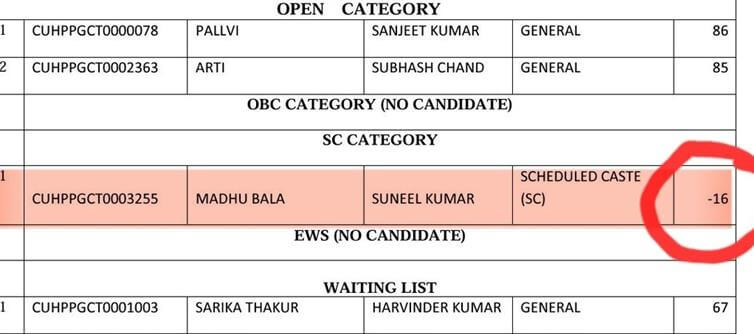
A shocking fact has surfaced from recruitment data: while a general category candidate with 84 marks was rejected, an SC candidate with –16 marks got selected. Yes, not even zero minus sixteen. This is not just unfair; it strikes at the very core of meritocracy in India. Here are five reasons why such caste-based selection policies need urgent rethinking.
1. Merit Gets Crushed Under Reservation
How can someone with 84 marks be “unfit” while someone with –16 is “fit”? This is not social justice — it is blatant injustice against merit and talent. A system that punishes excellence and rewards failure is broken by design.
2. Public Faith in Exams is Destroyed
Exams are supposed to be the great equalizer, giving everyone a fair shot. But when candidates see such absurd disparities, trust in the recruitment process collapses. This erodes confidence in government jobs and institutions.
3. Reservation Has Become Reverse Discrimination
What began as a tool for upliftment has turned into systemic bias against general category candidates. The child of a poor farmer in the general category is left stranded, while someone with negative scores in a reserved category walks through the door.
4. Quality of Governance and services Suffers
When candidates with –16 marks enter the system, it’s not just unfair to rejected aspirants — it’s dangerous for society. Inefficient, underqualified recruits in administration, medicine, engineering, or policing can have devastating long-term consequences.
5. Time for Reform, Not Blind Continuation
A reservation cannot mean selection without minimum standards. If the government truly wants upliftment, it must provide better education and opportunities at the school level, not allow people with minus marks to bypass merit and get jobs that shape India’s future.
⚠️ Final Word
Social justice cannot come at the cost of justice itself. When minus marks become the passport to selection, the system is not just flawed — it is rigged. It’s time india demanded reforms in reservation policies before talent, trust, and fairness are permanently buried.




 click and follow Indiaherald WhatsApp channel
click and follow Indiaherald WhatsApp channel